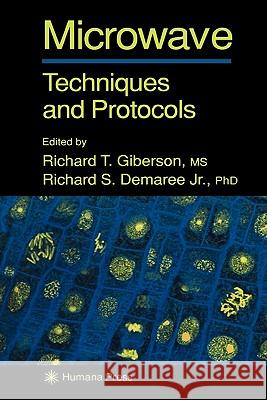Microwave Techniques and Protocols » książka
Microwave Techniques and Protocols
ISBN-13: 9781617372452 / Angielski / Miękka / 2010 / 220 str.
The contributors to this manual are uniformly from those labora- ries routinely using microwave technology to facilitate their processing methods in the various fields of microscopy. The methods and results these authors describe are the tangible evidence that microwaves can be used routinely as the basis for improved sample processing for micr- copy applications. These applications include complete sample proce- ing protocols for light and electron microscopy, decalcification, and immunocytochemistry. The overall time savings, ease of use, and qu- ity of results serve as justification for using microwaves in the labo- tory. The question as to whether there is a "microwave effect" is alluded to, but not discussed in any great detail. When the term microwave technology is used, it is generic and intended to mean equipment designed for laboratory versus household use. Microwave Techniques and Protocols is designed for anyone with a background and experience in sample processing for immunocytoch- istry, decalcification, light microscopy, or electron microscopy, and clearly demonstrates that microwave technology has a place in today's laboratory. Richard T. Giberson, Richard S. Demaree Jr., REFERENCES Giberson, R. T. Demaree, R. S., and (1995) Microwave fixation: understa- ing the variables to achieve rapid reproducible results. Microsc Res Tech 32:246-254. Giberson, R. T., Demaree, R. S., Jr., and Nordhausen, R. W. (1997) Four-hour processing of clinical/diagnostic specimens for electron microscopy using microwave technique. J Vet Diagn Invest 9:61-67. Jr. VhD Ms vi Preface . . . . . . . . . . . . . . . . . . . . . . . . . . . . . . . . . . . . . . . . . . . . . . . . . . . . . . . . . . . . . . . . . . . . . . . . . . . . . . . . . . . . . . . . . . . . . . . . . . v Contributors . . . . . . . . . . . . . . . . . . . . . . . . . . . . . . . . . . . . . . . . . . . . . . . . . . . . . . . . . . . . . . . . . . . . . . . . . . . . . . . . . . . . . . . .











